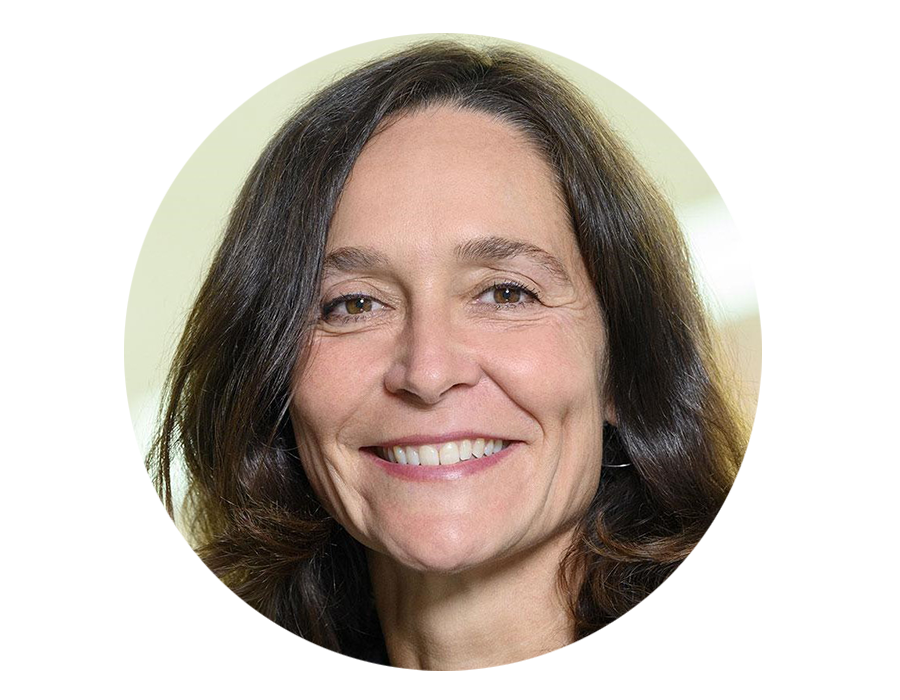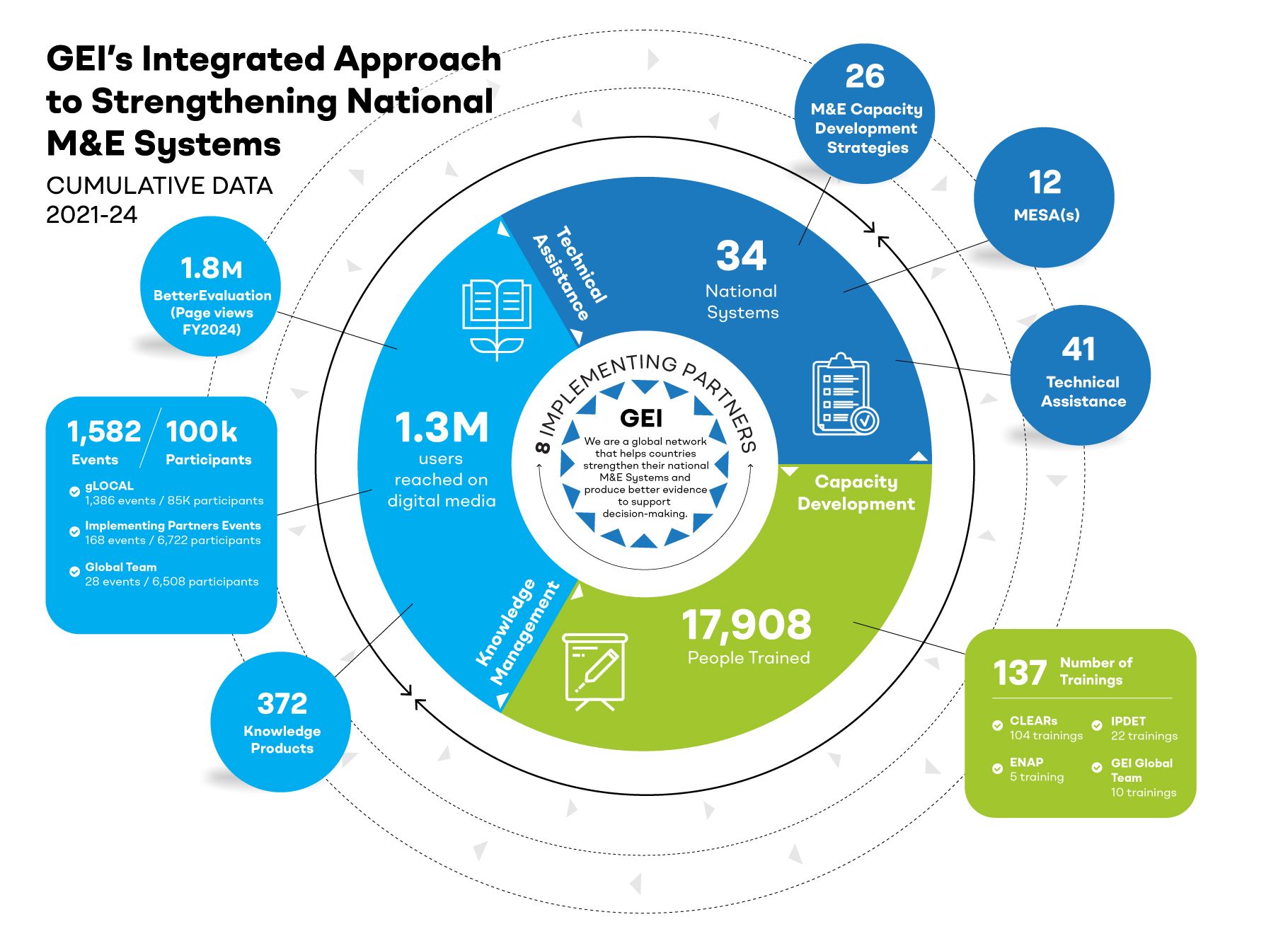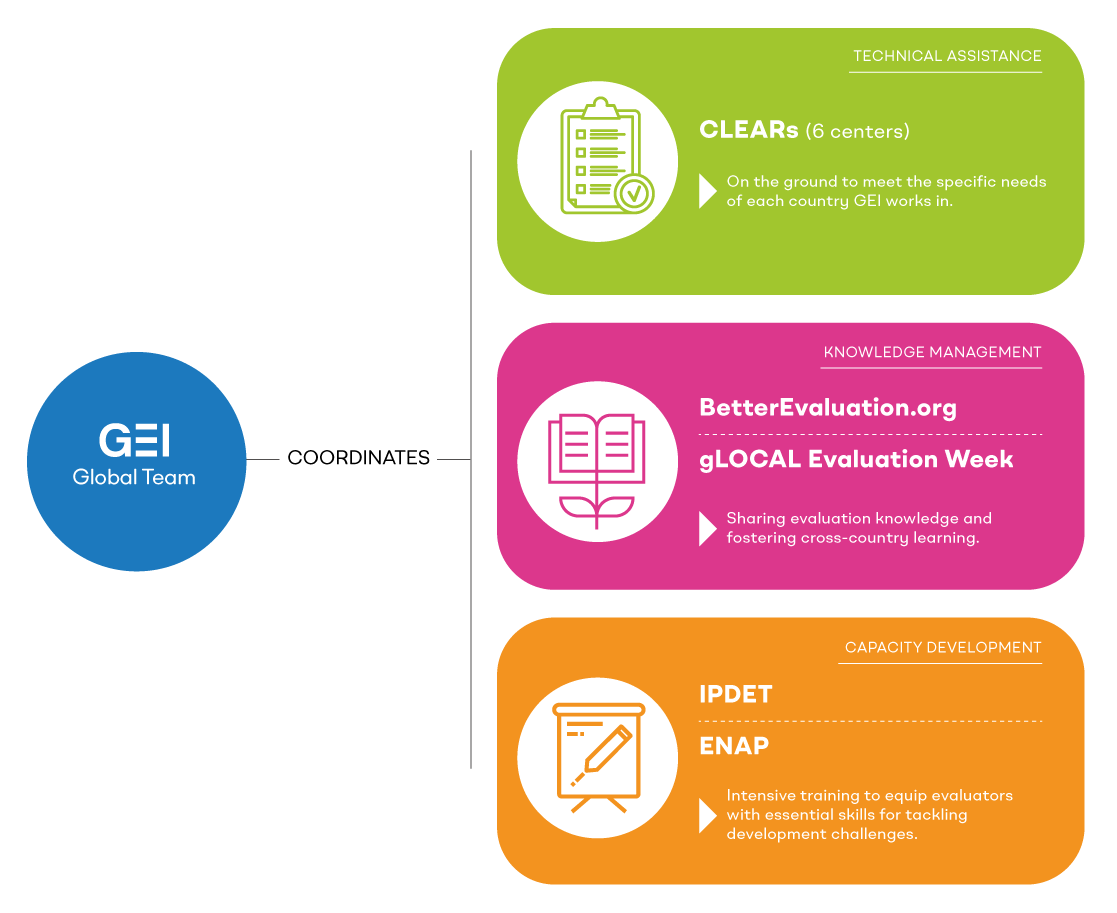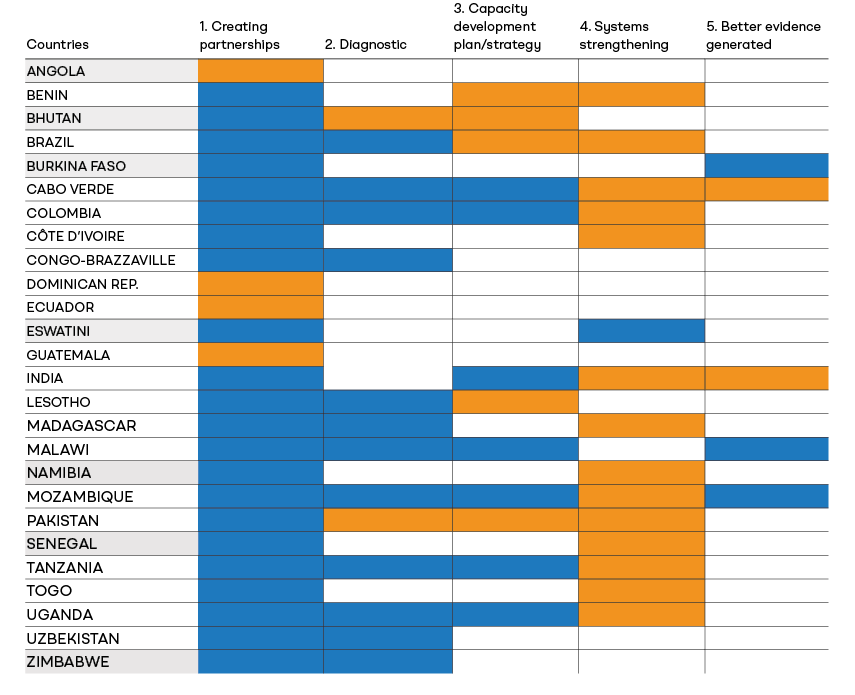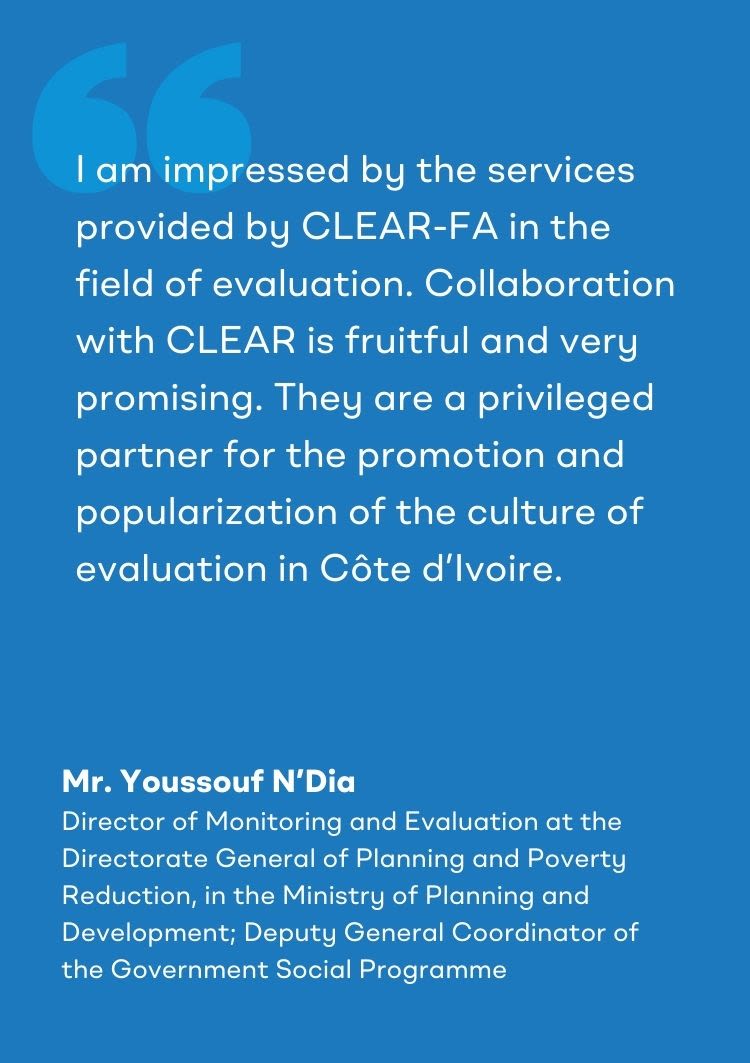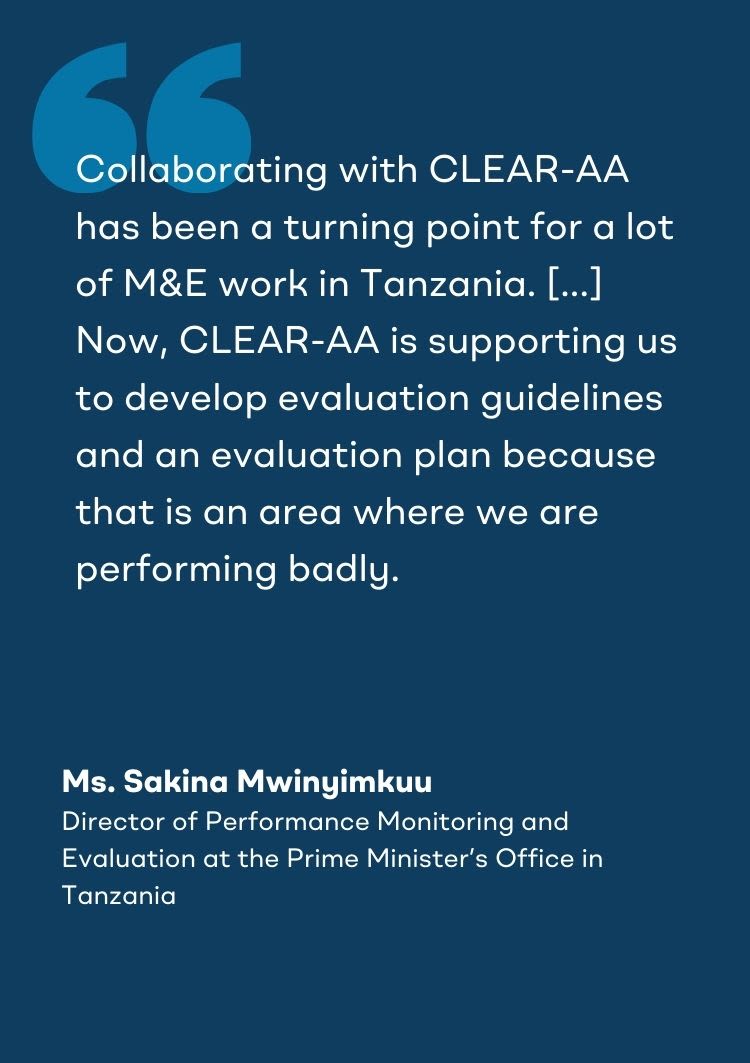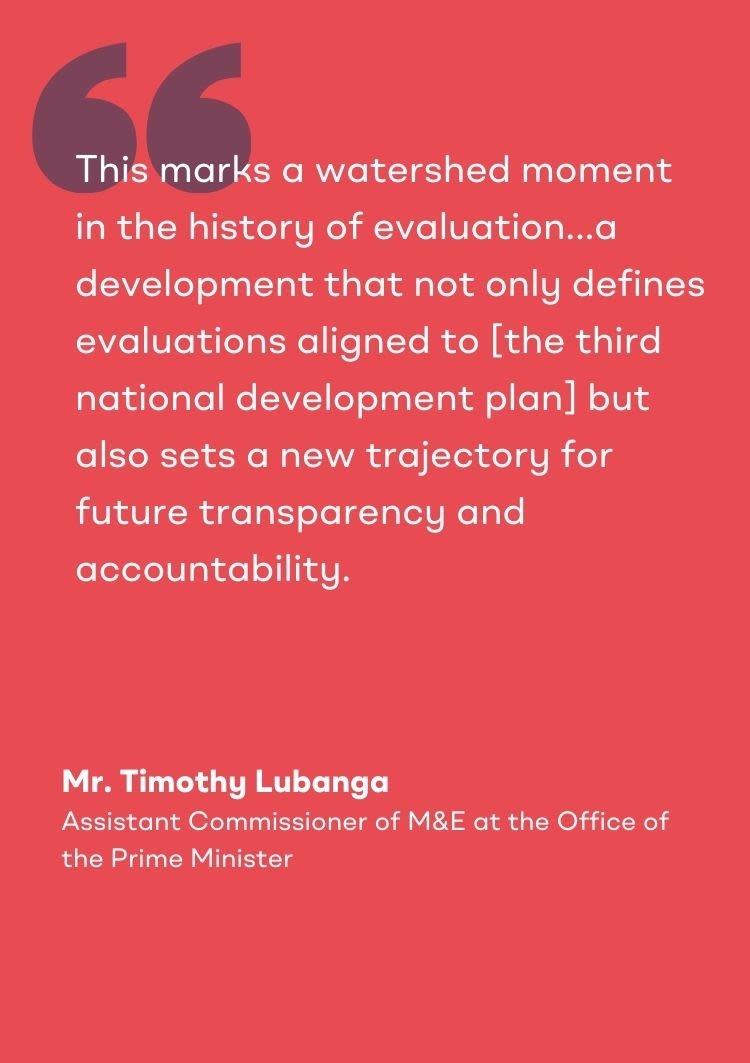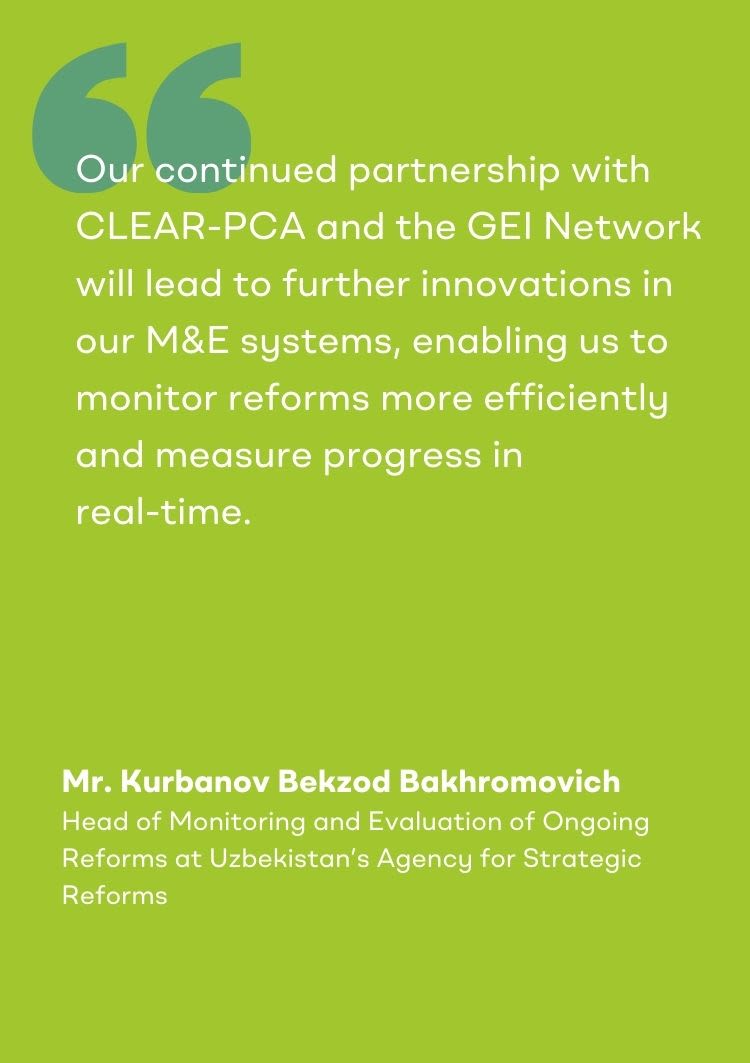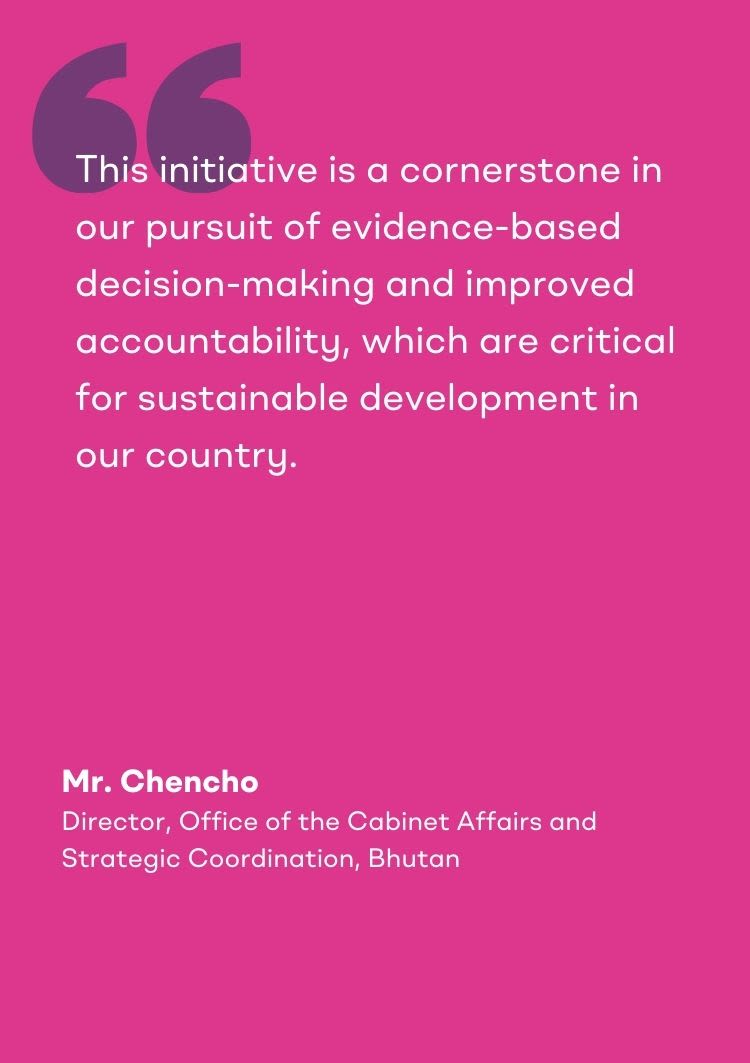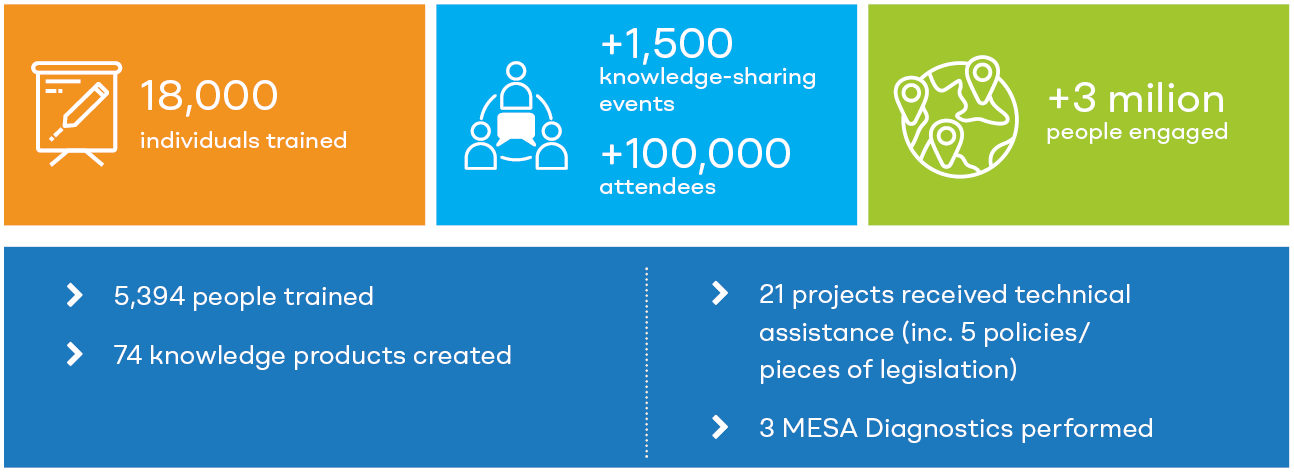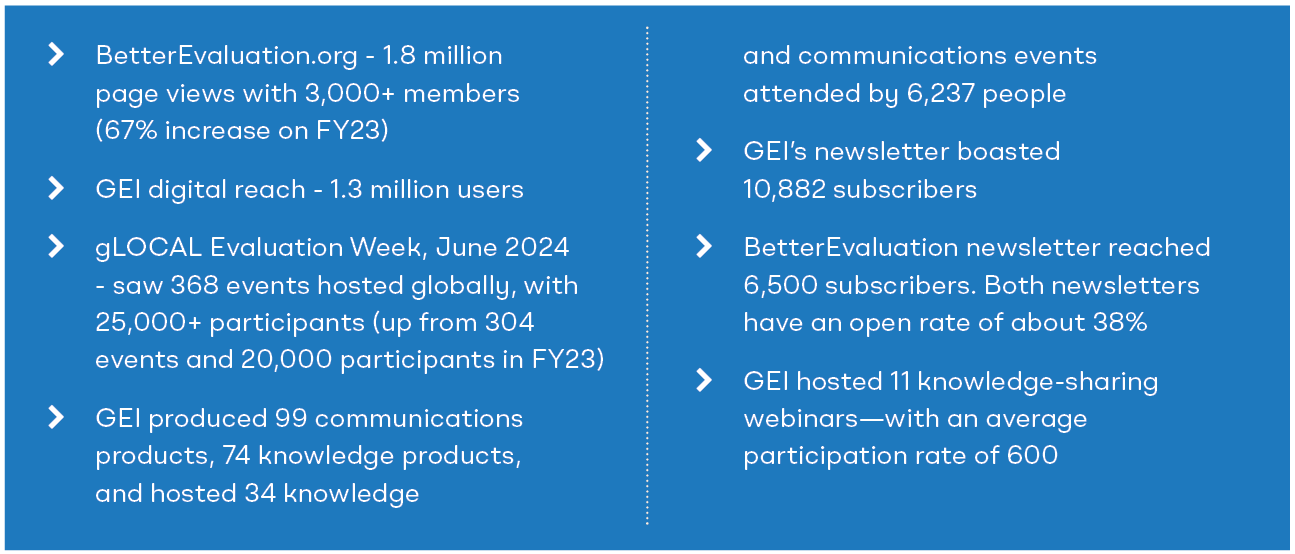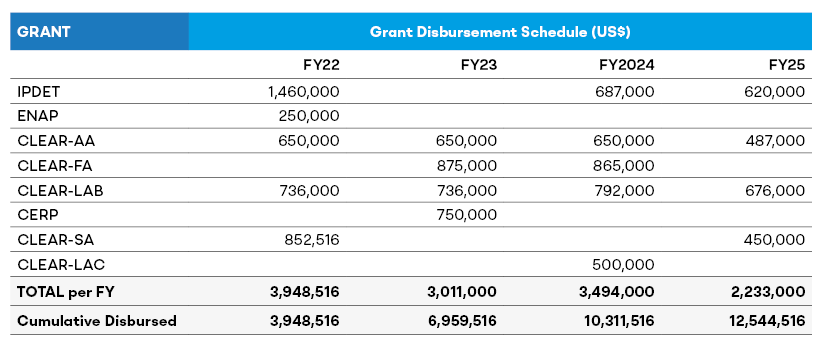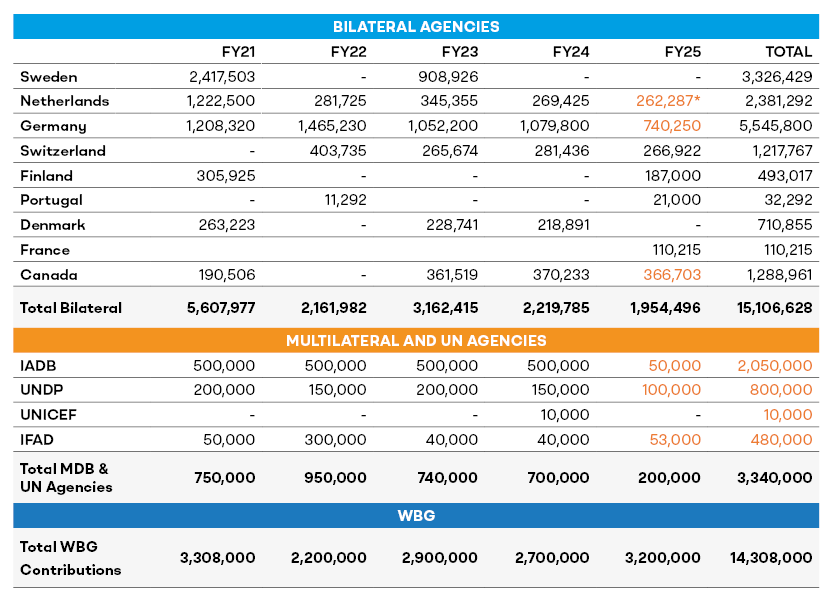Global Evaluation Initiative
Annual Report
July 2023 – June 2024 (FY2024)
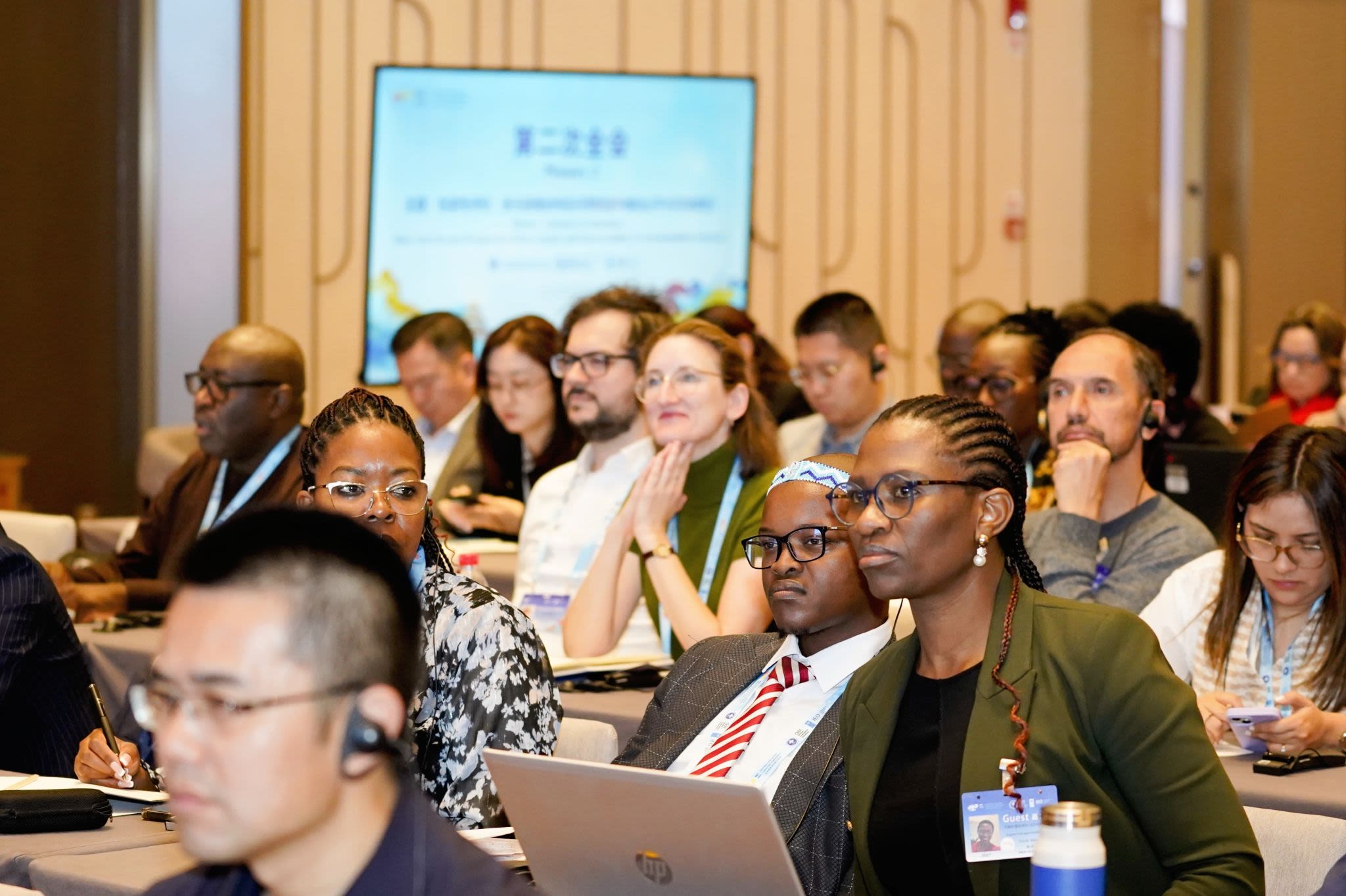
Sabine Bernabè
Sabine Bernabè
Sabine Bernabè
Director-General, Evaluation, for the Independent Evaluation Group (IEG) of the World Bank Group
Now in its fourth year, GEI and its implementing partners—the Centers for Learning on Evaluation and Results (CLEARs), ENAP, and IPDET—are at the forefront of a global effort to strengthen the capacity of evaluation systems in developing countries.
The Independent Evaluation Group sees capacity development in evaluation offices in developing countries as a key link in longer-term efforts to strengthen evidence-based decision-making and accountability in the developing world.
As global challenges grow in complexity, and crises become more frequent, strengthening local partnerships for evaluation is key to ensuring that the voices of those most affected by development programs are heard. We must also leverage new technologies like AI, geospatial analysis, and machine learning to elevate the precision and impact of evaluation. By shifting from performance measurement to assessing broader outcomes—e.g. through causal contribution—we can better understand the true impact of our interventions.
GEI’s work is more important than ever. In more turbulent times, all countries need the tools to monitor progress, design and implement evidence-based policies, and to correct course where needed. Together, under GEI, we are creating a network that exchanges global knowledge and experience about excellence in evaluation, promotes learning from others about what works, and that ensures better data is not only collected, but is also used to address today’s problems and shape tomorrow’s solutions.
Sabine Bernabè
Director-General, Evaluation, for the Independent Evaluation Group (IEG) of the World Bank Group
Now in its fourth year, GEI and its implementing partners—the Centers for Learning on Evaluation and Results (CLEARs), ENAP, and IPDET—are at the forefront of a global effort to strengthen the capacity of evaluation systems in developing countries.
The Independent Evaluation Group sees capacity development in evaluation offices in developing countries as a key link in longer-term efforts to strengthen evidence-based decision-making and accountability in the developing world.
As global challenges grow in complexity, and crises become more frequent, strengthening local partnerships for evaluation is key to ensuring that the voices of those most affected by development programs are heard. We must also leverage new technologies like AI, geospatial analysis, and machine learning to elevate the precision and impact of evaluation. By shifting from performance measurement to assessing broader outcomes—e.g. through causal contribution—we can better understand the true impact of our interventions.
GEI’s work is more important than ever. In more turbulent times, all countries need the tools to monitor progress, design and implement evidence-based policies, and to correct course where needed. Together, under GEI, we are creating a network that exchanges global knowledge and experience about excellence in evaluation, promotes learning from others about what works, and that ensures better data is not only collected, but is also used to address today’s problems and shape tomorrow’s solutions.
Isabelle Mercier
Director, Independent Evaluation Office, United Nations Development Programme (UNDP)
Evaluation is a fundamental component of good governance and development. Governments must integrate evaluation into their broader decision-making processes to ensure that evidence is accessible, meaningful, and actionable. Public institutions must make the best use of their resources, and evaluations provide the information required to enhance policies, programs, and services for citizens.
To underscore the importance of integrating evaluation into governance, the National Evaluation Capacities (NEC) Conference, held in Beijing in October 2024, served as a key platform for global collaboration and knowledge sharing. The NEC Conference, organized by UNDP, the Chinese International Development Cooperation Agency, and GEI was a remarkable gathering, only made possible by the strong participation of governments and civil society seeking this integration of evaluation into their larger governance structures. This global event provided an opportunity for evaluation stakeholders from over 100 countries to share insights and learn from one another’s experiences in reinforcing the importance of responsive and adaptable evaluation systems.
As we work toward the Sustainable Development Goals (SDGs), the NEC highlighted the need for evaluation to remain flexible, relevant, and focused on real-world challenges. A key outcome from NEC was the adoption of the “Beijing Action Plan: Towards Responsive Evaluation Systems for 2030”, a vital framework to guide our collective efforts in ensuring that evaluation systems continue to evolve and contribute effectively to sustainable development.
GEI serves as an important network connecting evaluation expertise with governments to build capacity and integrate evaluation evidence into decision-making processes. By supporting countries in building their evaluation capacity, GEI helps to strengthen national systems. Acting as a global platform, GEI links partners with the resources, tools, and training they need while advocating for the value of evaluation at regional and global levels. Looking ahead, we see GEI building on its position as a leading global platform to further strengthen and support the transformative power of evaluation evidence in driving progress toward the SDGs by 2030.
Isabelle Mercier
Isabelle Mercier
Isabelle Mercier
Director, Independent Evaluation Office, United Nations Development Programme (UNDP)
Evaluation is a fundamental component of good governance and development. Governments must integrate evaluation into their broader decision-making processes to ensure that evidence is accessible, meaningful, and actionable. Public institutions must make the best use of their resources, and evaluations provide the information required to enhance policies, programs, and services for citizens.
To underscore the importance of integrating evaluation into governance, the National Evaluation Capacities (NEC) Conference, held in Beijing in October 2024, served as a key platform for global collaboration and knowledge sharing. The NEC Conference, organized by UNDP, the Chinese International Development Cooperation Agency, and GEI was a remarkable gathering, only made possible by the strong participation of governments and civil society seeking this integration of evaluation into their larger governance structures. This global event provided an opportunity for evaluation stakeholders from over 100 countries to share insights and learn from one another’s experiences in reinforcing the importance of responsive and adaptable evaluation systems.
As we work toward the Sustainable Development Goals (SDGs), the NEC highlighted the need for evaluation to remain flexible, relevant, and focused on real-world challenges. A key outcome from NEC was the adoption of the “Beijing Action Plan: Towards Responsive Evaluation Systems for 2030”, a vital framework to guide our collective efforts in ensuring that evaluation systems continue to evolve and contribute effectively to sustainable development.
GEI serves as an important network connecting evaluation expertise with governments to build capacity and integrate evaluation evidence into decision-making processes. By supporting countries in building their evaluation capacity, GEI helps to strengthen national systems. Acting as a global platform, GEI links partners with the resources, tools, and training they need while advocating for the value of evaluation at regional and global levels. Looking ahead, we see GEI building on its position as a leading global platform to further strengthen and support the transformative power of evaluation evidence in driving progress toward the SDGs by 2030.
Dugan Fraser
Dugan Fraser
Dugan Fraser
Program Manager, Global Evaluation Initiative
IIn this edition of GEI’s Annual Report, I am thrilled to share the remarkable achievements of the past financial year (FY2024) and reflect on our ongoing efforts to strengthen national monitoring and evaluation (M&E) systems worldwide.
As we continue to provide our support to countries, it is increasingly clear that today’s development challenges are deeply interconnected. The need for collaborative efforts between stakeholders has never been more pressing. Effective communication and partnership between donors, government decision-makers, and civil society organizations are essential to avoid inefficiencies, reduce fragmentation and build trust. We remain dedicated to building and nurturing these crucial relationships to foster a more integrated approach to M&E.
As you will see in this report, over the past year, GEI has proved that decisions made with evidence produced from solid, trustworthy M&E systems have the potential to transform lives from Tamil Nadu to Colombia, Côte d’Ivoire and beyond. Your continuing support is vital as we strive to make evidence-based decision-making the norm, not the exception, and we push on with our mission to drive meaningful change in the field of M&E.
Dugan Fraser
Program Manager, Global Evaluation Initiative
In this edition of GEI’s Annual Report, I am thrilled to share the remarkable achievements of the past financial year (FY2024) and reflect on our ongoing efforts to strengthen national monitoring and evaluation (M&E) systems worldwide.
As we continue to provide our support to countries, it is increasingly clear that today’s development challenges are deeply interconnected. The need for collaborative efforts between stakeholders has never been more pressing. Effective communication and partnership between donors, government decision-makers, and civil society organizations are essential to avoid inefficiencies, reduce fragmentation and build trust. We remain dedicated to building and nurturing these crucial relationships to foster a more integrated approach to M&E.
As you will see in this report, over the past year, GEI has proved that decisions made with evidence produced from solid, trustworthy M&E systems have the potential to transform lives from Tamil Nadu to Colombia, Côte d’Ivoire and beyond. Your continuing support is vital as we strive to make evidence-based decision-making the norm, not the exception, and we push on with our mission to drive meaningful change in the field of M&E.
Executive summary
The Global Evaluation Initiative (GEI) supports governments and organizations in strengthening monitoring, evaluation, and evidence use to improve decision-making and development outcomes worldwide.
Coordinated by the Global Team in Brussels, GEI is an interconnected network. It shares knowledge through the BetterEvaluation.org platform and annually during gLOCAL Evaluation Week, trains evaluators through IPDET, ENAP, and the six CLEAR Centers are on the ground to respond to specific country and regional needs.
GEI uses a systems-based approach, offering diagnostics like the Monitoring and Evaluation Systems Analysis (MESA) tool, technical support, and tailored solutions, and prioritizes partnerships and knowledge sharing throughout.
In FY2024, GEI worked in 26 countries, partnered with IPDET, ENAP, and the CLEARs, to train 5,394 people, provided technical assistance to 21 projects (including 5 policies or legislations), and conducted 3 MESA Diagnostics.
Throughout the year, GEI expanded its digital and knowledge-sharing impact significantly. BetterEvaluation.org saw 1.8 million page views and 3,000+ members (67% growth from FY23), while GEI’s digital reach spanned 1.3 million users. gLOCAL Evaluation Week featured 368 events with 25,000+ participants (up from 304 events and 20,000 participants in FY2023).
GEI produced 173 knowledge and communications products and hosted 57 events with 8,580 attendees. The GEI newsletter reached 10,882 subscribers and the BetterEvaluation newsletter hit 6,500 subscribers, both maintaining a 38% open rate. Additionally, 11 webinars drew an average of 600 participants each.
Financially, GEI’s multi-donor trust fund received over $4.96 million in income, adding to cumulative contributions surpassing $17 million. These resources were directed toward grants for implementing partners, global teamwork programs, and targeted initiatives, with expenditures totaling $4.98 million. The remaining funds have been allocated to sustain operations through June 2025, ensuring the continued delivery of impactful programs worldwide.
Looking ahead, GEI is poised to deepen collaborations and innovate its capacity building approach. The launch of the Center for Learning in Evaluation and Results for Latin America and the Caribbean (CLEAR-LAC) in 2025 marks a major step forward in establishing regional hubs of excellence.
GEI remains steadfast in its vision to empower communities and decision-makers worldwide with the tools and knowledge to ensure evidence-based decision-making is institutionalized in developing countries.
How GEI Works
The mission of GEI is to build stronger M&E systems that support better decisions and improve development outcomes. As can be seen in figure 1 (above), over the past four years, GEI has grown to the point where it is playing a key role in the global effort to improve the use of evidence for decision-making and policy reform.
GEI’s Global Team, based in Brussels, coordinates the interconnected parts of the GEI Network. Firstly, BetterEvaluation.org and gLOCAL Evaluation Week are platforms for sharing evaluation knowledge and fostering cross-country learning. The International Program for Development Evaluation Training (IPDET) and the École nationale d’administration publique (ENAP) deliver intensive training to equip evaluators with essential skills for tackling development challenges. And the Centers for Learning on Evaluation and Results (CLEARs) are on the ground constantly adapting to meet the specific needs of each country we work in.
By complementing each other’s strengths—ranging from training and resources to collaborative knowledge sharing—GEI has created a powerful global ecosystem that is improving the impact and quality of evaluations worldwide, driving informed decision-making and producing more effective outcomes.
Over the past 4 years, GEI has worked in over 26 countries to support M&E and show that stronger M&E systems lead to better governance. GEI currently spans 26 countries, including 19 core countries and 7 that received on-demand assistance.
In FY2024, GEI continued to focus on empowering decision-makers to address some of the most pressing global challenges, namely, climate change, gender inequality, empowering youth, and improving M&E in fragile, conflict-affected, and violent (FCV) settings.
Country Partnerships
GEI supports national and sub-national governments in strengthening monitoring, evaluation, and evidence use through an integrated, systems-based approach. This includes diagnostic assessments, such as the Monitoring and Evaluation Systems Analysis (MESA), as well as technical and advisory services to help governments define needs, set goals, and implement tailored solutions. GEI emphasizes partnership-building with key stakeholders and the development and sharing of knowledge throughout the process.
Enhancing
M&E Systems at National and Sub-National Levels
GEI operates at national and sub-national levels to help developing countries tackle complex challenges. By working across these levels, GEI helps drive evidence-based, sustainable development. Below are some highlights of GEI’s work around the world at national and sub-national levels during FY2024.
Building Capacity at the National Level
At the national level, GEI supports governments in implementing capacity development plans and strengthening systems based on diagnostic findings, offering technical assistance, advisory services, and customized training.
Benin
- The Center for Learning on Evaluation and Results for Francophone Africa (CLEAR-FA), supported Benin in strengthening its national M&E system
- Provided technical assistance, policy advice, and capacity building
- New national evaluation law, passed n January 2024
Côte d'Ivoire
- Côte d’Ivoire adopted an evaluation law in December 2022
- CLEAR-FA conducted an institutional diagnosis and delivered training
- CLEAR-FA co-created implementing decrees for the evaluation law
- Côte d’Ivoire is creating an evaluation support fund to ensure sustainable financing
- Côte d’Ivoire is now seen as a model for other African nations
Tanzania
- The Center for Learning on Evaluation and Results for Anglophone Africa (CLEAR-AA) supported Tanzania to build capacity for evidence-based decision-making
- First national M&E framework established M&E units across ministries
- CLEAR-AA improved policy-relevant evaluations, accountability, and resource use
- CLEAR-AA fostered a strong evaluation culture
- CLEAR-AA aligned Tanzania’s M&E practices with international standards
Uganda
- CLEAR-AA supported the creation of Uganda’s first National Evaluation Plan (NEP)
- Worked closely with the Directorate for Monitoring, Evaluation, and Inspection
- Addressed M&E gaps by designing a comprehensive NEP template
- Facilitated co-creation workshops with ministries and stakeholders
- Strengthened accountability
- Fostered a culture of evidence-based decision-making
Malawi
- GEI supported the COVID-19 Urban Cash Intervention in Malawi
- Collaborated with the Ministry of Economic Planning’s M&E Division on capacity building
- Helped develop a national evaluation plan
- Assisted the establishment of Terms of Reference
- Supported the institutionalization of evaluation practices in the public sector
Uzbekistan
- The Center for Learning on Evaluation and Results for Pakistan & Central Asia (CLEAR-PCA) partnered with Uzbekistan to develop the country’s first national M&E system
- CLEAR-PCA created the MESA, providing a roadmap for M&E capacity building
- Workshops secured stakeholder support for the MESA report
- Provided support for Uzbekistan’s first M&E Decree
- Partnerships with the German Agency for International Cooperation and the World Bank aligned Uzbekistan’s M&E system with global goals
- CLEAR-PCA support positions Uzbekistan as a potential model for Central Asia
Bhutan
- The Center for Learning and Evaluation of Results in South Asia (CLEAR-SA) supported Bhutan’s national planning, budgeting, monitoring, and evaluation (PBM&E) system
- CLEAR-SA led consultations with the Office of Cabinet Affairs and Strategic Coordination to enhance the national PBM&E system
- Support aligns with Bhutan’s 13th Five-Year Plan
Colombia
- GEI worked with Colombia’s Directorate of Monitoring and Evaluation of Public Policies to strengthen the public policy evaluation system
- Produced the “Understanding the Use of Evaluation in Colombia” report
- GEI helped Colombia maximize the use of existing evaluations
- Advised on 2022-2026 National Council for Economic and Social Policy document
- Introduced the need for rapid evaluations and integration of the Ministry of Finance into M&E
- Helped reinforce Colombia as a regional leader in evidence-based governance and accountability
Building Capacity at the Sub-national Level
In very big countries, like Brazil and India, GEI and its partners also focus on the sub-national level. At the sub-national level, GEI builds local capacities through training programs, workshops, and initiatives aimed at government officials, evaluators, and civil society actors.
India
- CLEAR-SA provided support to the Tamil Nadu government
- Enhanced policymaking, improved data collection/analysis
- 2019 Elderly Panel Survey revealed 14% of elderly lived alone
- 87% living alone were women in poorer conditions
- As a result, pensions increased/resource centers built
- CLEAR-SA built capacity with the Department of Economics and Statistics
Foundations laid for sustainable, evidence-based governance
Brazil
- CLEAR-LAB collaborated with Jones dos Santos Neves Institute in the Brazilian state of Espírito Santo
- Developed Monitoring and Evaluation System of Public Policies
- The M&E system was used to evaluate 13 programs in 6 years
- Inspired 7 states to adopt similar systems
- CLEAR-LAB assisted structural development of the M&E system
- Trained specialists, created guides, helped institutionalize evaluation culture
- Espírito Santo model highlighted at the 2023 National Seminar on M&E Systems
These examples showcase the many ways GEI has worked to build and strengthen M&E systems around the world in FY2024. By bringing together partners with different expertise over the past year, GEI has ensured that each country receives the most comprehensive, effective, and context-sensitive support.
GEI and implementing partners’ yearly data (FY2024)
Training and Professional Development
Throughout FY2024, GEI has focused on enhancing the capacity of M&E stakeholders through a variety of training, learning, and professional development initiatives. These efforts equip participants with the skills and tools necessary to do M&E and appreciate the role of evidence in decision-making; to gather, analyze, and apply evaluative knowledge effectively; to conduct robust evaluations; and to improve the management and utilization of M&E systems. GEI’s commitment to global capacity building is further supported by its implementing partners, IPDET and ENAP, which deliver targeted M&E training programs tailored to both regional and global M&E stakeholders.
Since GEI started operations, we have trained almost 18,000 individuals in M&E, facilitated more than 1,500 knowledge-sharing events attended by 100,000 people, and engaged more than 3 million people through our digital platforms.
In addition, IPDET conducted 9 GEI-supported training courses attended by almost 400 participants—including crucial training for Parliamentarians, helping raise awareness of the importance of M&E—while ENAP contributed to panel discussions and on-site evaluation training.
GEI and implementing partners’ yearly data (FY2024)
GEI and implementing partners’ yearly data (FY2024)
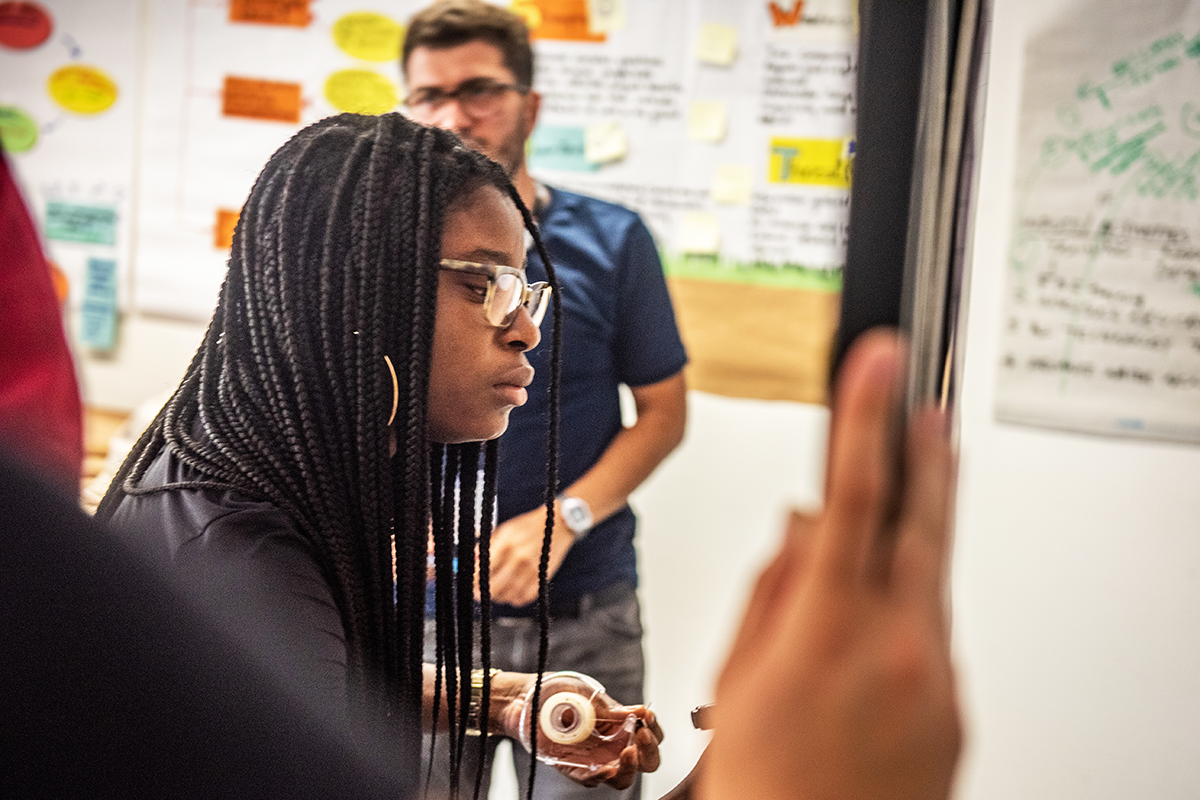
Knowledge Sharing
Knowledge sharing is vital if M&E practitioners are to build upon GEI’s training. GEI’s global and regional platforms allow countries to learn from one another’s successes and challenges, creating a rich environment to exchange ideas and experiences. GEI has been central in promoting a movement of people who practice and/or believe in the power of evidence-informed decisions. This movement is growing, as shown by both the number of people who consult our BetterEvaluation knowledge platform and those who attend our events.
In March 2024, in partnership with the African Evaluation Association (AfrEA), GEI supported the AfrEA Conference in Rwanda, which brought together over 650 government representatives, M&E experts, NGOs, academics, and multilateral organizations working in Africa to discuss best practices and innovative approaches. The Conference served as a platform for sharing knowledge and strengthening collaborative networks within the evaluation community and was a waymarker of GEI’s substantial progress on the African continent.
GEI and implementing partners’ yearly data (FY2024)
GEI and implementing partners’ yearly data (FY2024)
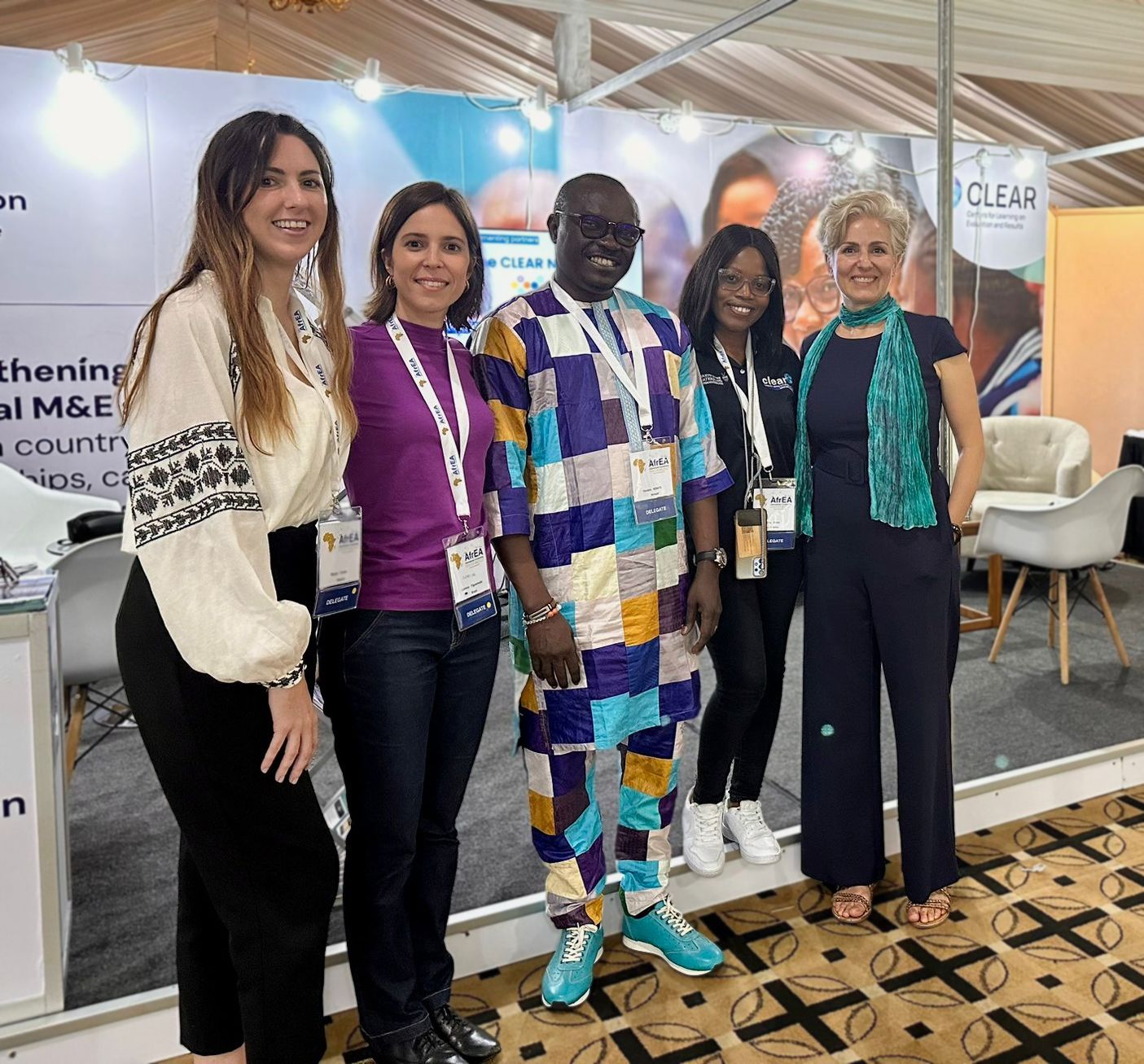
Climate Change
In FY2024, GEI advanced climate action by strengthening evaluation capacity and embedding environmental considerations into policy. It hosted workshops on rapid evaluation for Climate Investment Fund Observers, produced a video series on M&E in climate action, and green evaluation through its IPDET program, equipping global stakeholders to assess climate impacts and drive sustainable development through evidence-based decision-making. GEI advanced the Footprint approach for integrating environmental concerns in evaluations, partnering with DEval to help Colombia use this method in national evaluations. GEI is also creating a Climate MESA and Climate M&E Knowledge Paper to identify gaps in current systems and guide a new tool for climate M&E diagnostics, aiming to strengthen national M&E systems, enhance transparency, and support evidence-based climate finance.
GEI and implementing partners’ yearly data (FY2024)
GEI and implementing partners’ yearly data (FY2024)
Note: Events included webinars on footprint evaluation, SDG7 policies and programs in Asia Pacific, and impact evaluation in climate change mitigation. Presentations covered mainstreaming climate change, transforming evaluation for development impact, and decolonizing evaluation, with a discussion on fifty years of IEG. A total of 378 participants attended.

Gender Equality
GEI implemented a series of activities to share knowledge about gender and evaluation with partners and other stakeholders. These activities were part of GEI’s efforts to strengthen national M&E systems and were aligned with the Feminist Innovation in Monitoring and Evaluation (FIME) project.
GEI and implementing partners’ yearly data (FY2024)
GEI and implementing partners’ yearly data (FY2024)
Note: Events included online and in-person discussions on gender, capacity development through country-led evaluation, enhancing evaluation’s role in gender equality and social justice, feminist evaluations, using data systems to improve nutrition delivery to pregnant and lactating women, and harnessing gender indicators for progress. A total of 902 participants attended.

Youth
GEI advanced youth inclusion in evaluation by relaunching its internship program, offering hands-on training for young evaluators in developing regions, and worked with DEval, the EvalYouth Global Network, and P2P+ (Peer to Peer Career Advisory), to curate knowledge resources to support young and emerging evaluators, hosted on BetterEvaluation. It also organized youth events during gLOCAL Evaluation Week, promoting intergenerational collaboration, participatory methods, and innovative tools like Photo Voice to strengthen youth engagement in policy evaluations.
GEI and implementing partners’ yearly data (FY2024)
GEI and implementing partners’ yearly data (FY2024)
Note: Events included online discussions, webinars, in-person presentations, training sessions, and workshops on topics such as evaluation as a career, strengthening national evaluation systems, empowering indigenous capacities in M&E, involving youth in evaluation, and the challenges of including children’s voices in policy. CLEAR-FA also hosted a student conference. A total of 1,149 participants attended.
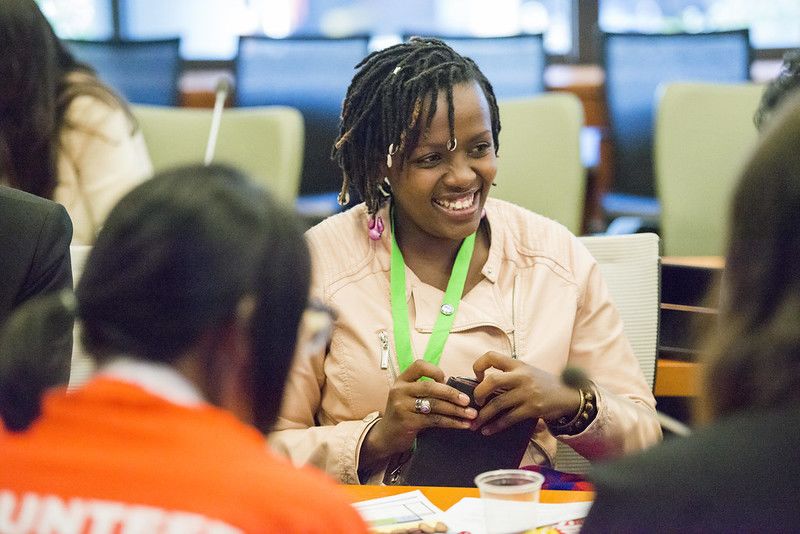
FCV settings
In May 2024, CLEAR-FA and the GEI Global Team hosted a webinar on building resilient national M&E systems amid political and administrative instability. Participants from Congo-Brazzaville, Benin, and CLEAR-PCA shared how their systems managed crises, while IEG contributed lessons from evaluations in FCV settings The panel discussed strategies for sustaining effective M&E systems during periods of adversity.
GEI and implementing partners’ yearly data (FY2024)
GEI and implementing partners’ yearly data (FY2024)
Note: Events included webinars on M&E in NGOs in Latin America and the Caribbean, adaptive evaluations, and building resilient national evaluation systems in crises. A total of 655 participants attended.
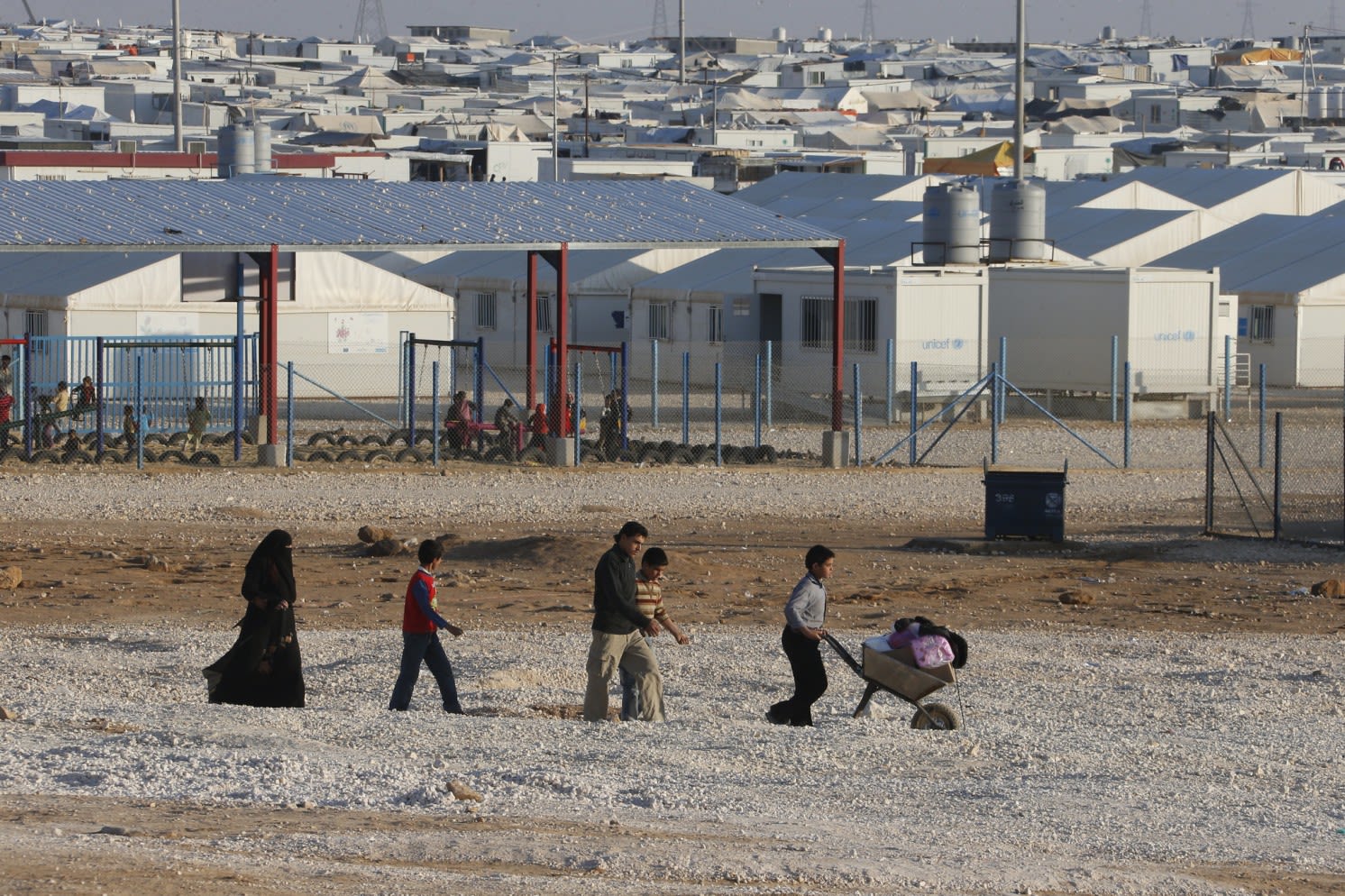
GEI Financials
GEI Multi-Donor Trust Fund Extension
On March 26, 2024, the GEI Partnership Council approved the GEI management team’s request for a 10-year extension of the multi-donor trust fund (MDTF) beyond its original closing date at the end of 2025, which has since been approved by the Bank and is now undergoing formalization.
Grants to Implementing Partners
A total of nine grants have been made to implementing partners since the inception of the GEI program. The grants provided to implementing partners are illustrated in table 2 (below). In FY25, additional funds will be provided to implementing partners as illustrated below.
The total resources donors provided to the MDTF have been allocated to implementing partners, marking an important achievement in the overall implementation of the GEI program.
Table 2 - Grants provided to GEI implementing partners.
GEI Income
The generous contributions committed by GEI donors to the GEI MDTF are illustrated in table 3 (below). Some new donors have committed new resources to GEI, demonstrating continued interest in the international development community for GEI’s agenda. We recognize and appreciate the support of the German Institute for Development Evaluation and UNDP who both provide full-time staff members working as part of GEI’s Global Team.
Table 3: Contributions committed by GEI donors to the GEI MDTF.
*Committed but not yet received | Status as of end Oct 2024
*Committed but not yet received | Status as of end Oct 2024
Conclusions
Thanks in large part to GEI’s efforts to mainstream M&E, national evaluation systems are now a central focus of conversation within many governments in developing countries.
As countries make significant strides toward building more resilient systems, GEI is uniquely positioned to serve as a catalyst for transformative change, benefiting both donors and countries. By expanding the GEI Network, strengthening local capacities, and fostering deeper regional collaborations, GEI is empowering countries to institutionalize robust M&E systems essential for evidence-driven policy and sustainable development.
As can be seen throughout this report, GEI provides donors a proven framework to enhance the effectiveness of investments, ensuring resources are deployed strategically and interventions are continuously improved through actionable insights. For countries, GEI’s tailored support fosters the skills, systems, and leadership necessary to navigate the complexities of M&E, enabling the development of transparent, data-informed policies that drive long-term progress.
The accomplishments of FY2024 underscore the transformative potential of evidence in shaping development outcomes. As we look to the future, GEI remains committed to broadening its reach, deepening its impact, and advancing its mission of empowering nations and communities to create a sustainable and resilient world.
None of this would be possible without the generous support of GEI’s donors. Their commitment to advancing evidence-based decision-making is driving meaningful change, enabling countries to build the systems, skills, and leadership essential for sustainable development. Their contributions are helping to shape a future where data-driven policies lead to greater equity, resilience, and progress worldwide.
CONTACT US
Reach out to us on social media: LinkedIn, Twitter, YouTube. You can sign up for our newsletter here. If you would like to contact us please reach us at contactgei@globalevaluationinitiative.org.
Download the full report as a .pdf
